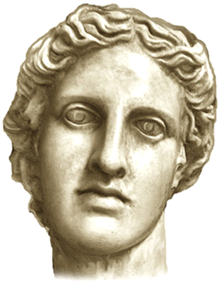...Best of Sicily presents... Best of Sicily Magazine. ... Dedicated to Sicilian art, culture, history, people, places and all things Sicilian. |
by Vincenzo Salerno | ||
Magazine Index Best of Sicily Arts & Culture Fashion Food & Wine History & Society About Us Travel Faqs Contact Map of Sicily |
Ducetius was born in eastern Sicily, possibly near Mene (now Mineo), in an area to which his Sicel (Sikeloi) ancestors had retreated following centuries-long amalgamation (intermarriage) and cultural assimilation with the colonising Greeks. The Sicels were originally an Italic people. In Ducetius' time the most important Sicel towns were Agyrium, Centuripae, Henna (now Enna) and three towns called Hybla, all still inhabited today. Under Greek domination Sikelian society was little more than a loose federation. Their occasional conflicts with the Greeks were usually based more on momentary social issues rather than broad cultural matters. Like the Hellenized Elymians of western Sicily, the Sicels had generally assimilated quite rapidly and easily with the Greeks, so it would be incorrect to conclude that Ducetius espoused a particularly "nationalist" movement. It should be remembered that the ancient Greeks spent as much time fighting each other as warring against the Persians and Carthaginians; Greece itself was hardly a united region, and Sicily's various Greek communities reflected this factionalization. Ducetius was educated as a Greek. When it was convenient, he played Greek against Greek, an effective strategy in Sicily where Greek cities were, in effect, independent states. In 460 BC (BCE) Ducetius lent military support to Syracuse against Katane (Catania), supposedly for offences of the former against the Sicels. Some sources credit him with founding Mene. He soon occupied Morgantina. Around 452 he founded Palické, later destroyed by the Syracusans. Alarmed by his increasing military power, the Syracusans decided, in 451, to impede him following his successful campaign against the Agrigentans near their home city. In 450 he was defeated near Nomae, tried, and exiled to Corinth. Around 446 Ducetius returned to Sicily and founded the Siculo-Greek city of Kale Acte, on a cape of the northern coast in what is now the province of Messina. (several sites have been suggested for this locality, whose precise site is disputed). This new city was populated by Sicels and some Corinthians. A renewed independence movement died with him around 440. In the immediate decades to come the Sicels' culture was complete subsumed by that of the Greeks. About the Author: Palermo native Vincenzo Salerno has written biographies of several famous Sicilians, including Frederick II and Giuseppe di Lampedusa. | |
Top of Page |
 More than two millennia following his death, Ducetius remains an
enigmatic figure. We are not even certain of his true name, or what he looked like. (The bust shown here is not actually
Ducetius but a Greek god.) His attributed name probably was not the one he
used during his lifetime. Ducetius shares a root with the Latin
"Dux" meaning "leader," an etymology shared with the English noble title
"duke" (Italian duca) and the Italian word "duce." The Greek name
of Ducetius was Doketios. What little we know of him is derived
from the Siceliot authors Timaeus and (later)
More than two millennia following his death, Ducetius remains an
enigmatic figure. We are not even certain of his true name, or what he looked like. (The bust shown here is not actually
Ducetius but a Greek god.) His attributed name probably was not the one he
used during his lifetime. Ducetius shares a root with the Latin
"Dux" meaning "leader," an etymology shared with the English noble title
"duke" (Italian duca) and the Italian word "duce." The Greek name
of Ducetius was Doketios. What little we know of him is derived
from the Siceliot authors Timaeus and (later)